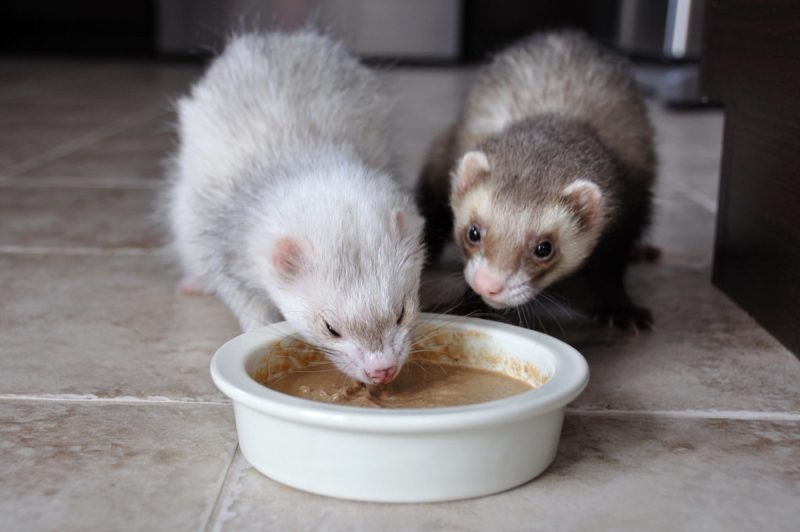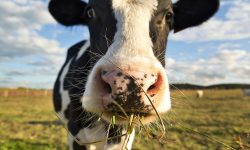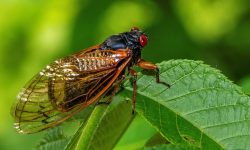Ferrets are energetic, curious, and highly active animals that require a specialized diet to stay healthy. Their sleek bodies and fast metabolism mean they burn energy quickly, so they must consume nutrient-rich foods throughout the day. As obligate carnivores, ferrets rely heavily on animal protein and fat, which fuel their daily movement, play, and exploration.
In the wild, ferrets mainly eat whole prey animals because their digestive system is built for rapid meat digestion. Domesticated ferrets share the same biological needs, which is why choosing the right foods is essential for their long-term health. The better their diet, the stronger their muscles, immune system, and energy levels become.
Whether you’re a new ferret owner or want to improve your ferret’s nutrition, this detailed guide explains everything you need to know. From daily feeding habits to safe foods and protein sources, we break down the essentials and explore the twenty foods ferrets love the most.
Understanding the Ferret Diet

Why Ferrets Need a Meat-Based Diet
Ferrets are obligate carnivores, meaning their bodies are designed to digest meat quickly while extracting essential nutrients from animal proteins and fats. They lack the ability to process high-fiber or high-carbohydrate foods, which pass through their system almost undigested. A meat-focused diet ensures they receive the amino acids necessary for muscle development and the energy needed to fuel their active nature.
How Their Digestive System Works
Ferrets have a very short digestive tract, allowing food to move through their bodies in just a few hours. Because of this, they need frequent meals and calorie-dense foods that can be absorbed quickly. Their metabolism also runs fast, meaning they burn energy at a higher rate than many other small pets. A diet rich in fat and protein supports steady energy while maintaining organ and immune health.
Balanced Nutrition for Domestic Ferrets
In captivity, ferrets thrive on high-protein commercial ferret food, raw or cooked meats, and occasional whole prey. Vitamins, minerals, and taurine are essential to their diet, just as they are for cats. Clean water and consistent feeding schedules prevent dehydration and digestive disturbances. Providing a diet that mirrors their natural eating habits ensures ferrets stay active, alert, and in peak condition.
20 Foods Ferrets Love the Most
1. Raw Meat
Raw meat is one of the best foods for ferrets, closely matching what they would eat in the wild. Chicken, turkey, and rabbit are highly digestible options that provide essential amino acids. Ferrets enjoy chewing raw meat because it supports muscle growth and sharpens natural hunting instincts.
Feeding raw meat offers high moisture content, which keeps ferrets hydrated and supports kidney function. The natural fat in meat fuels their fast metabolism and provides slow-burning energy throughout the day. Many owners use raw meat as a daily staple or part of a rotational feeding plan.
Raw diets must be handled safely to avoid bacterial contamination. Fresh cuts should be served in small amounts and removed after a short time to prevent spoilage.
2. Cooked Meat
Cooked meat like boiled chicken, turkey, or lean beef is another nutrient-rich food ferrets enjoy. Cooking removes pathogens while still providing high-quality protein. Soft textures make cooked meat ideal for young, elderly, or sick ferrets needing an easier meal to digest.
Because cooked meat lacks the moisture of raw meat, it can be mixed with broth to maintain hydration. It also works well as a training treat because of its strong smell and appealing flavor. Many owners use cooked meat to supplement commercial ferret food.
Although healthy, cooked meat should not include seasoning, oils, or salt. Plain, unseasoned cuts ensure safety and avoid digestive irritation.
3. Whole Prey
Whole prey such as mice, chicks, or quail is the most natural food a ferret can eat. These prey animals supply muscle meat, organs, bones, and fat in perfect ratios. Whole prey supports oral health by encouraging natural chewing behavior and maintaining strong teeth.
This food offers complete nutrition, eliminating the need for additional supplements. Ferrets also show instinctive excitement when fed whole prey, which can enrich their environment and reduce stress. Many breeders and experienced owners include whole prey weekly.
Not every owner is comfortable feeding whole prey, so it is optional rather than required. Frozen-thawed prey is recommended for safety.
4. Commercial Ferret Food
High-quality ferret kibble formulated with at least 35–40% animal protein and 20% fat is essential for daily feeding. Unlike cat food, ferret-specific formulas are designed for their rapid digestion and high metabolism. This ensures they receive consistent nutrition even when fresh meat is not available.
Kibble provides convenience and stability, especially for busy owners. Its crunchiness also helps clean teeth and reduce plaque buildup. Look for brands containing meat as the first ingredient instead of plant fillers.
Low-quality kibble with grains or corn should be avoided, as ferrets cannot digest carbohydrates well and may develop health problems.
5. Chicken
Chicken is a favorite protein for many ferrets. Its soft texture makes it easy to chew, and its mild flavor appeals even to picky eaters. Chicken thighs, breasts, and wings can all be offered raw or cooked.
This meat offers a balanced combination of fat, moisture, and protein. Bones from raw chicken can also be fed to adult ferrets for dental benefits and enrichment. It is one of the safest proteins for daily meals.
Chicken should be served plain and without seasoning. Rotating chicken with other meats prevents nutrient imbalance.
6. Turkey
Turkey provides slightly richer protein than chicken and helps diversify a ferret’s diet. Dark turkey meat is especially beneficial due to its higher fat content. Ferrets enjoy turkey pieces, minced meat, or wings.
This protein supports strong muscles and healthy skin. It is also useful when switching ferrets to a raw diet because its flavor is mild and familiar. Turkey offers excellent hydration when served raw.
As with all meats, turkey should be served plain and fresh, with bones offered only when raw.
7. Beef
Beef provides dense protein and iron, making it excellent for building strength and maintaining blood health. Ground beef, stew meat, or thin slices are all suitable options for ferrets who enjoy richer flavors.
Its high fat content provides sustained energy, ideal for active or young ferrets. Beef can be used as part of a weekly meal rotation to prevent dietary boredom. It is also beneficial during colder months when ferrets burn more calories.
Because beef is tougher than poultry, it may require smaller pieces for easy chewing, especially for young ferrets.
8. Lamb
Lamb offers intense flavor and rich fat that many ferrets love. It is excellent for ferrets needing weight gain or extra calories. Its natural oils help maintain shiny coats and strong immune systems.
Because lamb is rich, it is best served in moderation. It pairs well with lighter meats like chicken or turkey to create a balanced feeding plan. Many ferrets enjoy lamb chunks as a high-energy treat.
Fresh, unseasoned cuts are ideal, and lamb bones can be fed raw under supervision.
9. Organ Meat
Organs such as liver, heart, and kidney are essential in a ferret’s diet. They provide vitamins A, B, and iron that support blood health and organ function. Heart meat also contains taurine, a critical nutrient.
Organs should make up around 10% of a raw diet. Liver, in particular, is very nutrient-dense and must be fed in limited portions to avoid vitamin toxicity. Most ferrets enjoy the rich flavor of these meats.
Rotating organ meats ensures ferrets get diverse nutrients while maintaining digestive balance.
10. Eggs
Eggs offer complete protein and healthy fats, making them an excellent supplemental food. Ferrets can eat raw or cooked eggs depending on preference. Scrambled or boiled eggs are gentle on sensitive stomachs.
Eggs help maintain shiny coats and support muscle growth. They are particularly helpful during seasonal shedding or recovery from illness. Their soft texture also makes them ideal for older ferrets.
Eggs should be fed a few times a week rather than daily to maintain diet balance.
11. Fish
Fish such as salmon or sardines provide omega-3 fatty acids that promote heart and coat health. These oils support the immune system and reduce inflammation. Ferrets usually enjoy fish mixed with other meats.
Because fish is low in taurine, it should be fed occasionally rather than as a main protein source. A few small servings per week work well for most ferrets. Frozen-thawed fish ensures safety and freshness.
Avoid seasoned or smoked fish, which can upset digestion.
12. Duck
Duck is a fatty protein that offers strong flavor and excellent caloric density. It is perfect for active ferrets or those needing extra weight. The dark meat is tender and easy to chew, making it very appealing.
Duck provides high moisture and natural oils that support digestion. It is also an excellent winter food for maintaining warmth and energy. Many ferrets eagerly pick duck over leaner meats.
Raw or lightly cooked duck is best, with plain cuts free from spices.
13. Quail
Quail offers small bones, organs, and meat in a convenient size for ferrets. It is a natural whole prey option that mirrors their wild diet. Ferrets enjoy tearing and chewing quail pieces.
The balanced nutrient profile supports muscle growth and digestive health. Quail is particularly helpful for young ferrets learning to eat raw or whole prey. It is also a great enrichment food.
Quail can be fed whole or portioned, depending on ferret size.
14. Rabbit
Rabbit meat is lean, soft, and easily digestible, making it perfect for daily meals. It supports muscle development without excessive fat. Many ferrets prefer its mild flavor.
Rabbit is ideal for ferrets on weight-control plans because it provides protein without contributing to obesity. It also works well in raw diet rotations. Both whole rabbit and pre-cut pieces are suitable.
Rabbit bones can be fed raw, offering dental benefits and natural chewing enrichment.
15. Turkey Hearts
Turkey hearts are rich in taurine, which supports heart and eye health. They are highly palatable and easier to chew than larger organ meats. Many ferrets consider turkey hearts a delicacy.
These hearts offer excellent hydration and protein, making them great for active ferrets. Their soft texture makes them ideal for young or elderly ferrets needing easily digestible food.
They can be fed raw or cooked as part of weekly organ portions.
16. Chicken Wings
Chicken wings give ferrets natural bone and meat together, encouraging chewing that keeps teeth clean. They love crunching through the cartilage and softer bones.
Wings provide balanced moisture and fat while supporting jaw strength. Many owners include wings several times a week as enrichment or raw diet staples.
Raw wings are safest because cooked bones can splinter. Supervised feeding ensures safety.
17. Bone Broth
Bone broth is excellent for hydration and digestive support. It offers minerals, collagen, and amino acids without being heavy. Ferrets enjoy sipping warm broth, especially when ill or recovering.
Broth stimulates appetite and provides gentle nutrition. It also helps maintain healthy joints and coat shine. Many owners mix broth into kibble or meat for added moisture.
Broth must be plain, without onions, garlic, or salt.
18. Duck Hearts
Duck hearts offer rich flavor and excellent taurine content. Their fatty texture provides energy while supporting organ and muscle health. Ferrets often prefer duck hearts over other organs.
These hearts are useful during growth phases or high-activity periods. They help maintain strong metabolism and provide hydration. Their soft texture makes them easy for all ages to eat.
Duck hearts can be mixed with other meats for variety and balance.
19. Beef Liver
Beef liver is packed with vitamins A, B, and iron, supporting blood health and immunity. Ferrets enjoy its strong flavor in small portions. It is one of the most nutrient-dense foods available.
Because liver is so rich, it should be fed sparingly—usually once or twice a week. It pairs well with lighter proteins to balance the meal. Small cubes or slivers work well for training and enrichment.
Fresh, clean liver ensures maximum nutrition and safety.
20. Clean Water
Water is the essential component of a ferret’s diet. It supports digestion, temperature regulation, and organ function. Ferrets must have access to fresh water at all times.
Hydration prevents kidney stress and keeps their metabolism stable. Both bowls and bottles can be used, depending on the ferret’s preference. Most ferrets drink more from bowls because they are easier to access.
Regular cleaning ensures water stays free of bacteria and debris.
FAQs About Ferret Diet
Do ferrets need meat every day?
Yes, ferrets require daily meat because their bodies rely on animal protein and fat. They cannot digest plant material effectively.
Can ferrets eat cat food?
High-quality cat food may work temporarily, but ferret-specific food is better because it matches their nutritional needs more closely.
Are vegetables safe for ferrets?
Vegetables are not recommended. Ferrets cannot digest fiber and may develop digestive blockages.
How often should ferrets eat?
Ferrets eat multiple small meals throughout the day due to their fast metabolism and short digestive system.
Is cooked meat better than raw meat?
Both are acceptable, but raw meat more closely matches their natural diet. Cooked meat must be plain and unseasoned.
Can ferrets eat fish?
Ferrets can eat fish occasionally. However, it should not replace meat because fish lacks essential taurine.
What foods are toxic to ferrets?
Chocolate, onions, garlic, dairy products, sugary snacks, grains, and high-fiber foods are dangerous for ferrets.
Do ferrets need supplements?
Ferrets on balanced raw or commercial diets usually do not need supplements unless recommended by a veterinarian.
Can ferrets drink milk?
No, ferrets are lactose-intolerant and can develop severe digestive issues from milk or dairy products.
How much water do ferrets need?
Ferrets drink frequently, especially when eating dry food. Fresh water should always be available in clean bowls or bottles.
Final Thoughts
Understanding what ferrets eat is essential for keeping them healthy, energetic, and happy. A diet built around high-quality protein, fat, and moisture ensures they thrive both physically and mentally.
Whether you choose raw feeding, cooked meats, or commercial ferret food, offering balanced nutrition will support their long-term well-being. With proper care and a natural diet, ferrets can enjoy a vibrant life full of play, curiosity, and adventure.






